SANCTUARY STARS: How a tutor’s T-shirt changed a young Chinese vet’s life forever
08 June 2016
As Animals Asia’s Vet Intern, Wang Jing is part of a new wave of young, animal welfare-aware Chinese vets – but it took a T-shirt to start her on the path to a dream job.
Name: Wang Jing AKA “Max”
Position: Vet Intern
Time spent with Animals Asia: 11 months
Location: China Bear Rescue Centre, Chengdu
What is your typical day?
For the first two weeks of every month I work as a vet intern. That means I’ll do rounds and health checks with the vets as well as consultation and surgery on small animal day with another vet or by myself (Note: small animal day is every Friday and includes care for all staff pets – it entails education, information on care, vaccines and de-sexing).
In the third week, my role shifts to being a hospital vet nurse. I take responsibility for medication, lab duty and husbandry for all hospitalised animals. For the final week, I’m the anesthetist and I prepare for health checks for the bears. Besides all these, I work as veterinary translator – ensuring communication between foreign and Chinese staff on veterinary matters when our translation team are not onsite or are busy.
What were you doing before you joined Animals Asia?
I was a vet student at China Agricultural University. This is my first job.
How long is your internship?
It should be one year, but I am planning to extend my contract.
What are you ambitions beyond that?
I want to become a good vet.
How is vet care improving in China?
I would say, from my perspective, it’s improving quite fast. Not only on a technical level but also in terms of animal welfare. Even though some vets still have much to learn regarding animal care – there is enthusiasm to study. They attend conferences and many learn English specifically to read more articles and essays. I believe with all this effort, Chinese vets can make a growing difference to animal care.
What do you most like about working for Animals Asia?
I like the range of the work we do here but most of all I like the people.
What did you know about Animals Asia before you started working there?
I heard about it from my professor Dr Jin, he was wearing a black Animals Asia T-shirt one day, and it was really cool! After I heard where the T-shirt came from and the story behind it, I followed Animals Asia’s Weibo (the Chinese version of Twitter).
I found out that apart from saving bears, Animals Asia helps dog and cats and provides public education on animal welfare. Then, several months before I graduated, Monica (a former vet with Animals Asia) came to my university and her speech touched me. That was when I decided to apply for this job.
Much of your work must be with ageing bears? What are the problems they face?
Yes, they face many problems. Many have poor mobility as a result of their age and, of course, the time they spent on bile farms. There they had poor nutrition and no chance to exercise.
Other problems include hypertension, teeth fractures and liver disease. We can’t be sure why so many bears experience hypertension, but it would be reasonable to relate it to the long-term stress they suffered on bile farms.
It’s easy to imagine how bored they were and how much they suffered when they were in a cage hardly bigger then their body. That’s why so many have teeth wear and fractures - they had nothing else to do but bite the bars and sway backwards and forwards (stereotyping). Liver disease, in particular liver tumours, are another regular problem we see.
Do you get the chance to visit the bears enjoying the sunshine at the sanctuary, and how does it feel to watch them being happy after all they have been through?
They throw the dark past away and they just run into the new life. I feel happy for them, I laugh at them when they are being silly and that’s what a real life should be. All our bears are amazing.
How does it feel to be part of the Animals Asia team?
It makes me proud. I feel a lot of responsibility on me to provide a good quality of life for animals.
BACK
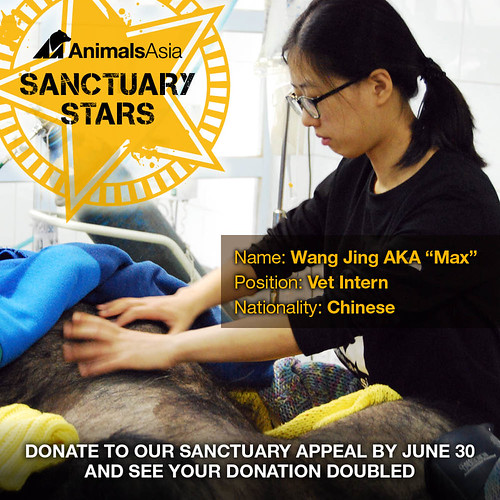
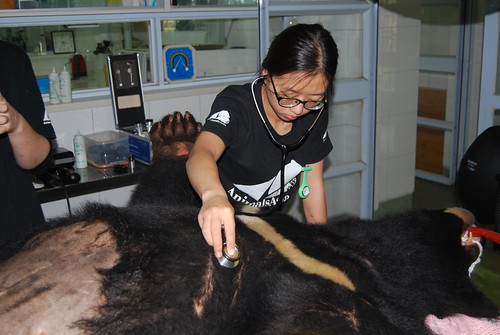
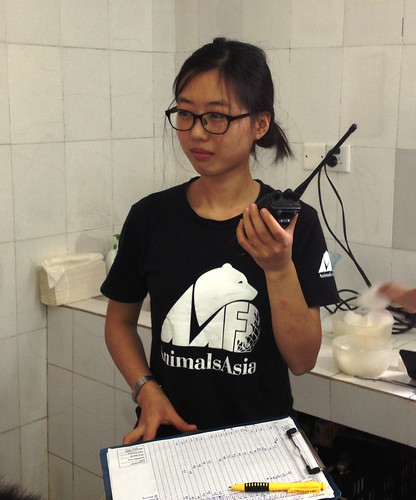




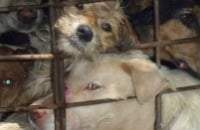 5 reasons the dog meat trade must end
5 reasons the dog meat trade must end
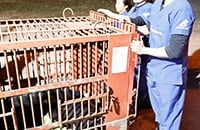 New year, new home for Christmas the Bear!
New year, new home for Christmas the Bear!
 Veterinary welfare training – pain management
Veterinary welfare training – pain management